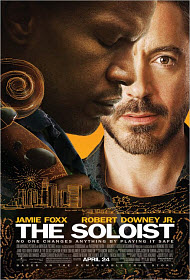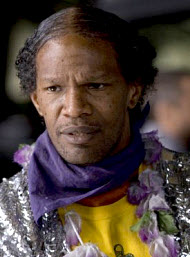The Soloist
 for thematic elements, some drug use and language.
for thematic elements, some drug use and language.
Reviewed by: Daniel Thompson
CONTRIBUTOR
| Moral Rating: | Better than Average |
| Moviemaking Quality: |
|
| Primary Audience: | Adults |
| Genre: | Biography Music Drama |
| Length: | 1 hr. 49 min. |
| Year of Release: | 2009 |
| USA Release: |
April 24, 2009 (wide—1,800 theaters) |











POVERTY—What does the Bible say about the poor? Answer
Why does God allow innocent people to suffer? Answer
What about the issue of suffering? Doesn’t this prove that there is no God and that we are on our own? Answer
Does God feel our pain? Answer
The Origin of bad—How did bad things come about? Answer
What kind of world would you create? Answer
| Featuring |
|---|
| Jamie Foxx (Nathaniel Ayers), Robert Downey Jr., Catherine Keener, Stephen Root, Tom Hollander, Rachael Harris, Angela Featherstone, Nelsan Ellis, Justin Martin, Lisa Gay Hamilton, Michael Bunin, David Jean Thomas, Meggan Anderson, Matt Besser, Alejandro Patino, Robyn Jean Springer, Hallie Lambert, Maggie Wagner, Justin Rodgers Hall, Susane Lee, Paul Greenberg, Ilia Volok, Marissa Ghavami, Troy Blendell, Lemon, Lejla Hadzimuratovic, Ingrid Coree, Jules Sanchez, Wayne Lopez, Jeff Sutherland, Ralph Cole Jr., Paul Edney, Artel Kayàru, Rob Nagle, Franklin Ruehl, Annie McKnight, Kai Nuuhiwa, George Meyers, Kirsten Lea, Sharon Savene, Janaya Sultze, Esa-Pekka Salonen, Aurelius DiBarsanti, Joshua Cabrera, Kitty Kreidler, S. Zev Esquenazi, Paul Cruz, Marcos De Silvas, Edward Kiniry-Ostro, Karmyn Tyler, Patrick Tatten, Wally Lozano, Charlie Weirauch, Michael Maddigan, Troy Williams, Holly Sherman, Richard Hansen, Jayce Bradley, Joe Hernandez-Kolski, Halbert Bernal, Ricky Marciano, Pete Brown, Therese Kortesmaki, Pete Ilarius, Heather La Bella, Lauren E. Gates, Francesca Kortesmaki, Valentyna Svyatchenko, Palma Lawrence Reed |
| Director |
|
Joe Wright “Atonement,” “Pride and Prejudice” |
| Producer |
| DreamWorks SKG, Krasnoff Foster Productions, Participant Media, Participant Productions, Studio Canal, Universal Pictures, Working Title Films, Rikki Lea Bestall, Tim Bevan, Josephine Davies, Eric Fellner, Gary Foster, Russ Krasnoff, Jeff Skoll, Leeann Stonebreaker, Patricia Whitcher |
| Distributor |
“Life has a mind of its own”
According to NAMI (National Alliance on Mental Illness), approximately 1.8 million Americans experience some form of severe mental illness each year. Many of the more severe cases involving mental illness occur in the homeless population of the US. It’s this world that covers “The Soloist”, a compelling film that not only educates on the topics of homelessness and mental illness, but also delivers an emotional, captivating narrative that’s based on a true story.
The story centers on the relationship between Los Angeles Times reporter Steve Lopez and Nathaniel Anthony Ayers. Ayers, a former student of the esteemed Juilliard School of performing arts, suffers from the debilitating mental disorder Schizophrenia. He now lives on the streets of Los Angeles playing a two string violin, and is one of some 90,000 homeless who call that city home. Lopez stumbles upon Ayers and realizes that this is a prime story: a musical savant turned homeless. Lopez, who has alienated everyone in his life who once cared for him, takes it upon himself to tell Ayers’ story. What starts out as an interesting article turns into a deep bond between two kindred souls.
It’s within this structure that Lopez learns a lot about Ayers as well as himself. He believes that he has some obligation to ‘fix’ Ayers, thinking that all he needs is medication and focus, and he could once again be among the great living musicians. He ends up learning, along with the audience, a great deal about those with mental illnesses, and this drastically changes his approach in evaluating what is most important in his life, as well as the life of Ayers.
What we come to realize, as the film moves along, is how similar Lopez and Ayers actually are, and how much they need each other. Both talk to themselves, both are wary of relationships with others, and both need direction, as well as a friend. And it’s through this common bond that the viewer also realizes that it is Lopez, not Ayers, who is in fact “The Soloist”.
The film’s narrative is so captivating that it speaks for itself, but “The Soloist” is also blessed with a dynamic cast and crew. Jamie Foxx is very convincing as Ayers. It doesn’t hurt that Foxx himself is a classically trained musician and his skills are put to work here. His performance goes beyond music, however, and it showcases his talents as one of the best actors in the business. Robert Downey Jr. was the perfect choice to play Lopez. He brings a vulnerability to the role that’s undeniable. Joe Wright’s direction gives a clear, realistic perception of what homelessness in Los Angeles really looks like.
The content in “The Soloist” is geared towards adults. There are some profanities, as well as some other various attributes of the film that may be considered gross or unnerving, but this is part of the culture that frames the film. Considering the subject matter, the language is kept to a minimum, and there is very little sexual content to speak of. Director Joe Wright (“Atonement”) perfectly balances the need to showcase the toughest parts of homelessness and mental illness, while staying away from any gratuitous content.
Even better, the spiritual content in “The Soloist” is outstanding. While not a Christian film, the entire movie centers around the idea of there being a creator. Whether it’s the Scriptural messages seen on lit billboards, or one of the many conversations between Ayers and Lopez, biblical concepts of love and grace shower the film. In one poignant scene, Lopez is trying to explain to his ex-wife Mary how unbelievable it is to hear Ayers play, and how he just can’t explain it. “It’s called grace,” responds Mary. It’s grace indeed, because for Lopez it’s a gift he doesn’t deserve, but receives anyway. After alienating everyone from his life, it’s a gift that shows him the importance of belief and friendship, as well as how liberating grace can be.
If there’s one fault with “The Soloist”, it’s that it has been advertised as a super-inspirational, feel-good type of film, similar to the likes of “Mr. Holland’s Opus”. If the viewer goes into the theater expecting a neatly wrapped package of a film containing a “they all lived happily ever after” ending, they will be disappointed. The film is too true to life to let false sentiment get in the way. Instead, we get a realistic portrayal not only of Schizophrenia, but also of life, at its best and worst. We also get a deeply moving, emotional picture that emphasizes biblical principles like trust, redemption, sacrifice and grace, and it does so in a way that’s accessible and honest.
Violence: Moderate / Profanity: Heavy / Sex/Nudity: Minor
See list of Relevant Issues—questions-and-answers.


Moral rating: Better than Average / Moviemaking quality: 4
The straight-forward truth is that “The Soloist” is just a bit of a yawn, and quite frankly isn’t really worth the $8.50.
Moral rating: Average / Moviemaking quality: 2½
Also, the man portrayed as a believer (the cello teacher) was seemingly portrayed in a negative light, as well. Another typical Hollywood portrayal of Christianity. Let us realize what Christ did for us on Calvary and not be desensitized by Hollywood and this world. This movie as well as many others could have easily been made without the use of these elements that are so offensive to our faith and to our Lord and Savior Jesus Christ!
Moral rating: Extremely Offensive / Moviemaking quality: 3
Moral rating: Extremely Offensive / Moviemaking quality: 1
Moral rating: Offensive / Moviemaking quality: 1½
Moral rating: Offensive / Moviemaking quality: 2

My Ratings: Moral rating: Better than Average / Moviemaking quality: 5